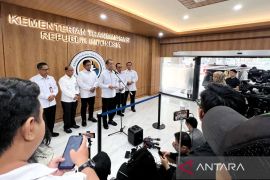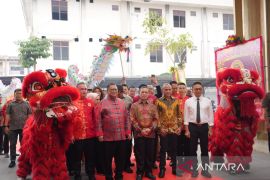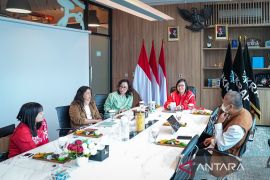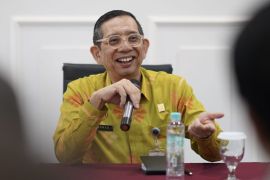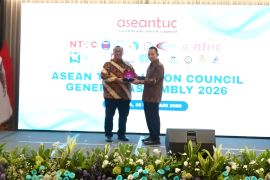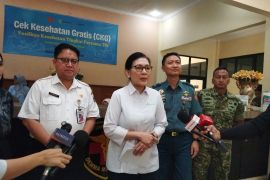"Scientification will provide scientific evidence for herbal medicines on their effectiveness to cure a disease," BPPT Head Marzan Azis Iskandar.Jakarta (ANTARA News) - Since time immemorial, herbal medicines have been used by forefathers in Indonesia to heal different kinds of diseases, yet they have not gained recognition, at least until recently, by the medical world to be recommended in doctor`s prescriptions.
Seeing the healing power and economic potential of at least 3,000 kinds of herbal medicines in Indonesia, the government is now however preparing 12 hospitals throughout the country to open herbal clinic services where doctors can prescribe herbal medicines for their patients.
This is a government effort to promote herbal medicines in Indonesia as a complementary healing to modern medication. "Thus, herbal medicines have now become alternatives at hospitals for the people to cure their diseases," Chairman of the Indonesian Herbal Medical Association (PDHMI) Hardhi Pranata said recently.
The 12 hospitals where the government is now preparing to open clinic services for patients willing to use herbal medication included the Cipto Mangunkusomo general hospital (RSCM), the Dharmais hospital, the Persahabatan hospital in Jakarta, the Sardjito hospital in Yogyakarta, the Hasan Sadikin hospital in Bandung, West Java, the Dr Soetomo hospital in Surabaya, East Java, and the Shangla hospital in Bali.
For this purpose, doctors who are assigned to cater patients at the hospitals` herbal clinics are given education and training on herbal medicines.
"After attending the training, the doctors will get a certificate which authorizes them to provide herbal medication prescription for their patients," Hardhi said adding that the Indonesian Medical Association had also been determined to take herbs as a complementary medicine to modern medication.
Besides training doctors, the government is also trying to promote herbal medicines through a `scientification` process at the Agency for Assessment and Application of Technology (BPPT).
"Scientification will provide scientific evidence for herbal medicines on their effectiveness to cure a disease," BPPT Head Marzan Azis Iskandar said.
It has so far taken a long time and big cost to conduct a research and clinic test to turn a herbal medicines into a scientific product.
"Now technology has been available that can shorten the process with low cost. But to do that cooperation with all sides from the government, private institutions and the experts is needed," he said.
Technology is important which according to natural medicine researcher Prof Dr Subagus Wahuono of the Yogyakarta-based Gajah Mada University, is needed to enrich the active compounds of herbal medicines.
"There are two important things for the development of herbal medicines, namely to enrich the active compounds and their frames of the a herb material," he said.
He said that although Indonesia had abundant medicinal plants yet their active compounds that could be extracted were relatively low. "For example, from one kilogram of a medicinal plant, only about one milligram active compounds could be extracted," the professor said.
He said that the active compounds provide herbal medicines with the ability to cure a disease. The higher the active compounds of a herbal medicine product had, the higher ability it had to cure a disease.
Subagus said that active compounds and their frames could be enriched with a bio-technology development. "But conducting a bio-technology research will need a high cost," he said.
That is why, only a small number of herbal medicine products in Indonesia have undergone a scientification process.
Head of the Research and Development of Medicinal Plants and Traditional Medicines of the Ministry of Health, Indah Yuning Prapti said that of the 3,000 kinds of herbal medicines circulating in the country, only four had undergone a scientification process.
"The four are herbal medicines for inflammation, gout, hypertension and cholesterol.
There are still a lot of ones that need scientification process," she said.
In the meantime, to advance herbal medicine researches in the country, Soegijapranata Catholic University (Unika Soegijapranata) in Semarang, Central Java, and Providence University in Taiwan have agreed to cooperate in herbal medicine research.
"A team from our university currently visiting Providence University in Taiwan reached the cooperation agreement with the hosts," Unika Soegijapranata spokesman Antonius Juang Saksono said recently.
Antonius said Unika Soegijapranata Rector Prof Budi Widiaarko who led the team to Taiwan had reported that the two universities had reached an agreement to cooperate in various fields of research including herbal medicine.
He said both parties would carry out a research on the prospects of herbal medicine industry to go international.
"One of the researches which had been agreed on is about the prospects of herbal medicine in Indonesia and its development in the future," Antonius said.
Indeed, with their economic and healing potentials, herbal medicines promise a good business prospect in Indonesia.
This has led publicly listed state-owned drug and cosmetic firm PT Kimia Farma (KAEF) to consider acquiring a number of herbal medicine companies in East and Central Java worth up to Rp40 billion.
"Herbal medicine business in Indonesia is offering a big chance in the future so that KAEF is considering to acquire a number of herbal medicine companies," KAEF Corporate Secretary Ade Nugroho last week.(*)
Reporter: Andi Abdussalam
Editor: Aditia Maruli Radja
Copyright © ANTARA 2011

